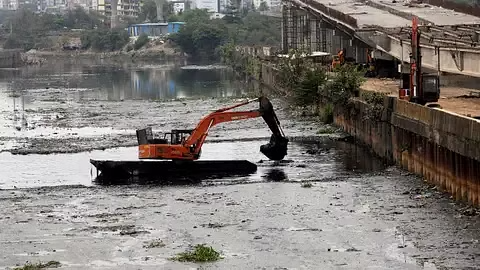For years now, the Sabarmati River, home to Mahatma Gandhi and one of the iconic centres of India’s freedom struggle, retained its tourist attraction. Sadly, the Sabarmati River has borne the brunt of the degenerative effects of industrial activities. Industrial units have, over the years, discharged pollutants into it, making it the second-most polluted river in India.
This was confirmed by the Union Ministry of Jal Shakti in a Central Pollution Control Board (CPCB) report. According to a certain section of the media, the report observed that the stretch of the river — from Raysan in Gandhinagar to Vautha downstream on the border of the Dholka block of Ahmedabad — is the second-most polluted stretch in India. Tamil Nadu’s Cooum river is the most polluted in the country.
The Raysan-Vautha stretch of Sabarmati recorded shocking levels of BOD of 292 mg/L, second to the Avadi-Sathya Nagar stretch of the Cooum river in Tamil Nadu with a BOD of 345 mg/L. The Usgs.gov defines BOD (Biological Oxygen Demand or Biochemical Oxygen Demand) as the quantity of dissolved oxygen in milligrams of oxygen per litre of water, consumed by microorganisms to decompose the organic matter present in water.
What is more that 13 rivers in Gujarat were found non-compliant with the prescribed water quality criteria with regard to BOD.
The High Court had directed the Gujarat government to take note of the polluted water of the Sabarmati River. In July 2022, the Union Minister of Housing and Urban Affairs, Hardeep Singh Puri, reportedly claimed that an astronomical amount of Rs 282.17 crore had been spent on cleaning Sabarmati in the past three years. The Ahmedabad Municipal Corporation too had spent Rs 4.81 crore in the past three years for cleaning floating waste (approximately 6,000-7000 tonnes) from the river, claimed media reports.
Regardless of the cleaning activities, Sabarmati’s numbers continue to paint a dismal picture. A drone survey recorded high BOD levels of 360 milligrams per litre (mg/L) following storm water drain passing through the Danilimda area. Furthermore, it has recorded levels of 265 mg/L from the outfall of a 60 MLD sewage treatment plant (STP).
Environmentalist Rohit Prajapati was quoted as saying that the flow continued in the Danilimda area where industries closed down. He added that the discharge also came from industries through the Mega Pipeline and other unknown sources, hinting at illegal connections.
Furthermore, it emerges that sewage diversion networks and interceptor sewers, which were implemented to divert sewage from the river and eliminate the pollutants, have been ineffective.
Meanwhile, the Sabarmati Riverfront will be expanded to another 11.5 kilometres, an addition of five kilometres. However, the amicus curiae in a Public Interest Litigation had suggested to the court that steps must be initiated to curb the Sabarmati River pollution instead of undertaking work for the phase-II extension. The amicus curiae, according to reports, observed that the river lost its ecological flow and carries only industrial sewage 120 kms downstream.
The HC, in a January 2022 order, noted, “Unfortunately, neither AMC nor GPCB paid any attention to all the aforesaid provisions of law… AMC was expected to act promptly at an appropriate point of time, more particularly, after realising the conditions were going from bad to worst… It proceeded in complete ignorance of the provisions of the GPMC Act, 1949″.
Several industries have shut operations following HC’s orders after reports emerged of heavy metals such as mercury being deposited in the river. The industries have been seeking relief to reopen their units after agreeing to be compliant with the pollution standards.
Also Read: G-20 Food Fest To Be Held Next Week In Delhi












